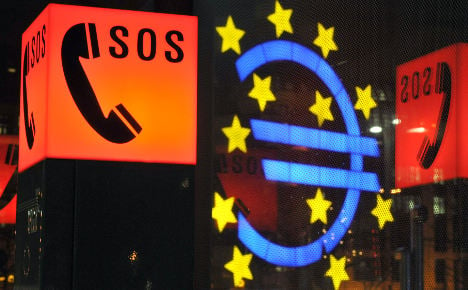Germany’s key financial policy-makers reacted positively to the news. In a statement, German finance minister Wolfgang Schäuble said: “I welcome the Spanish government’s determination to recapitalize the banks via the European rescue funds with corresponding conditions.”
German central bank chief Jens Weidmann told public television station ARD, “I am confident in the Spanish government, which has already begun undertaking full measures in the labour market.”
The financial markets also seemed to welcome the decision, with the Dax in Frankfurt rising 2.2 percent on Monday morning.
But in the German media, the news has enjoyed a far more critical reception. Many newspapers were quick to dampen the optimism by warning of tough tests ahead.
The Düsseldorf-based financial newspaper the Handelsblatt said the eurozone should be braced for “further shockwaves.”
The paper identified next week’s Greek elections as a “severe test” and warned that a eurozone meeting at the end of the month had to come up with “concrete solutions towards a fiscal union” – otherwise the doors of the financial markets could slam shut on Spain – or even Italy.
The Leipziger Volkszeitung was another such dissenting voice. The Saxony newspaper warned that the bailout could be just the prelude to “a gigantic emergency operation for the Spanish patient… that could make Greece billion-euro loan look like small beer.”
Mass-circulation daily Bild articulated the same scepticism in rather more strident tones. “Schäuble wants us to believe a one-off aid package will bring lasting success,” the paper thundered in an editorial. “But he said the same about Greece two-and-a-half years ago, and since then money has flowed uninterrupted into a bottomless Greek pit. So much for one-off!”
“One thing is sure,” concluded Germany’s most widely-read newspaper. “It will be the German taxpayers footing most of the bill for the euro-rescue. They at least deserve to be told the whole truth.”
The European heads of state have failed to learn from the example of Greece, according to Düsseldorf’s Rheinische Post. The paper blasted the rescue package as “incomprehensible faith-healing.”
“Bitter experience has taught us that it will be German money propping up the latest falling domino of the euro crisis,” it concluded sadly, laying much of the blame at the door of Spanish Prime Minister Mariano Rajoy and his predecessor José Luis Rodriguez Zapatero for the dishonesty of their “mighty boasts.”
For the Hamburger Abendblatt, the problems are more fundamental. “The Spanish case lays bare two unresolved weak points,” was the verdict of the major broadsheet in Germany’s second-largest city.
“Even after the outbreak of the great financial crisis in autumn 2008, the financial markets continue to lead their own unaccountable existence… and in addition, the euro countries have abandoned their fundamental principle, whereby each country is liable for its own debts.”
The paper likened the situation to an emergency on board a boat, where “the strong must help the weak.”
Only the Neue Osnabrücker Zeitung was prepared to offer qualified support for the new measures. In next week’s Greek elections, the paper pointed out, “the Greeks could very well set a course for an exit from the euro. That’s why it’s so important to defuse the Spanish problem.”
The commentary concluded, “The eurozone’s fire fighters cannot risk the possibility of two blazes at once.”
DAPD/The Local/jpg



 Please whitelist us to continue reading.
Please whitelist us to continue reading.
Member comments